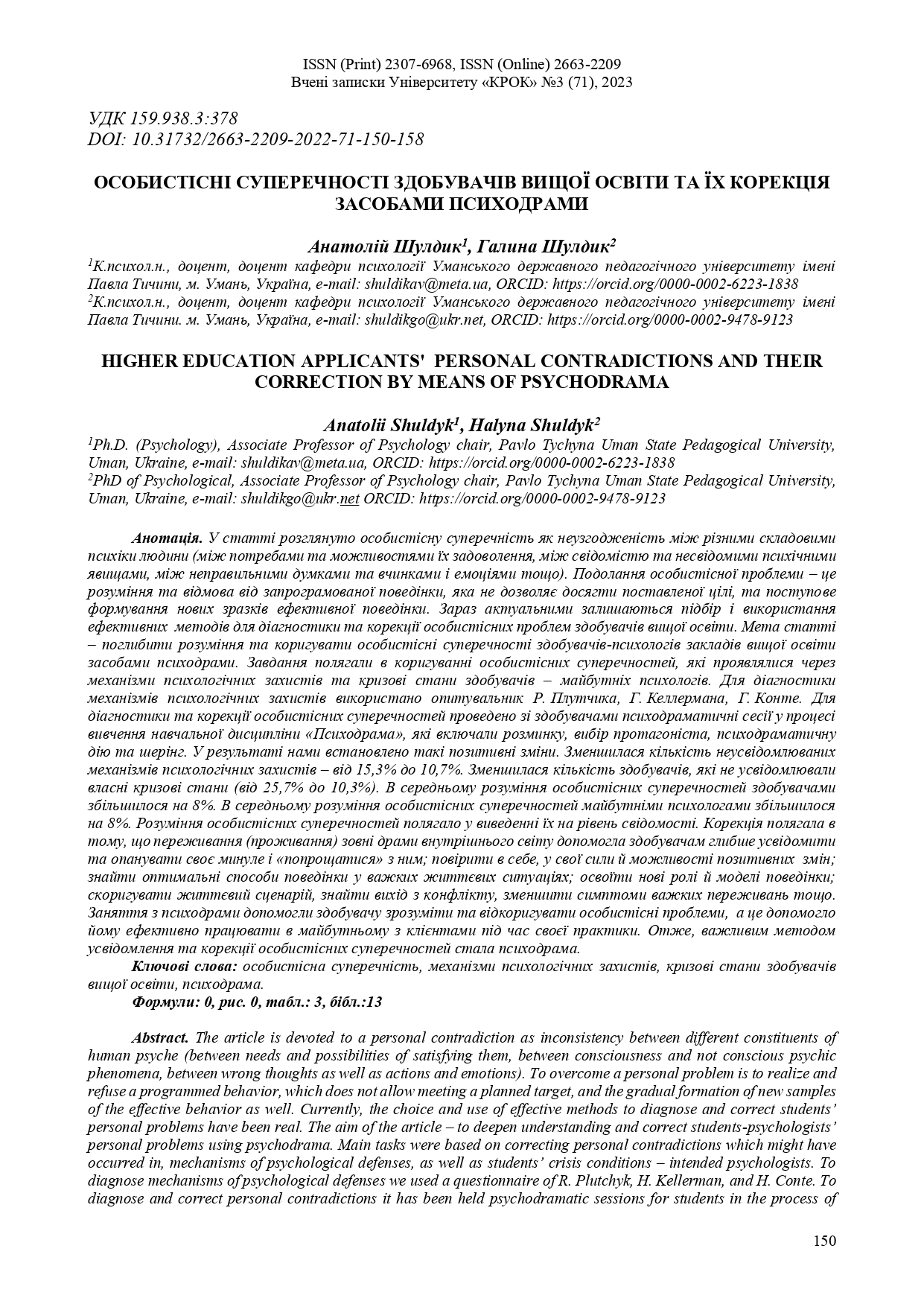HIGHER EDUCATION APPLICANTS' PERSONAL CONTRADICTIONS AND THEIR CORRECTION BY MEANS OF PSYCHODRAMA
DOI:
https://doi.org/10.31732/2663-2209-2022-71-150-158Keywords:
personal contradiction, mechanism of psychological defenses, students’ crisis conditions, psychodramaAbstract
The article is devoted to a personal contradiction as inconsistency between different constituents of human psyche (between needs and possibilities of satisfying them, between consciousness and not conscious psychic phenomena, between wrong thoughts as well as actions and emotions). To overcome a personal problem is to realize and refuse a programmed behavior, which does not allow meeting a planned target, and the gradual formation of new samples of the effective behavior as well. Currently, the choice and use of effective methods to diagnose and correct students’ personal problems have been real. The aim of the article – to deepen understanding and correct students-psychologists’ personal problems using psychodrama. Main tasks were based on correcting personal contradictions which might have occurred in, mechanisms of psychological defenses, as well as students’ crisis conditions – intended psychologists. To diagnose mechanisms of psychological defenses we used a questionnaire of R. Plutchyk, H. Kellerman, and H. Conte. To diagnose and correct personal contradictions it has been held psychodramatic sessions for students in the process of learning the discipline “Psychodrama”. Those sessions consisted of warming-up, a selection of the protagonist, a psychodramatic action as well as sharing. Consequently, we have defined next positive changes The quantity of not conscious mechanisms of psychological defenses – from від 15.3% до 10.7%. The number of students who were not aware of their own crisis states decreased (from 25.7% to 10.3%). The average awareness of personal problems by students has increased to 6.9%. The understanding of personal contradictions was based on their transformation into the level of consciousness. The correction was based on the believe that the external emotional experience (feeling) of the inner world out of drama helped students understand thoroughly and realize their past, as well as say “good-bye” to them; believe in themselves, in their power and possibilities of positive changes; find out the optimal ways to behave in difficult life situations; master new roles and models of behavior; correct life scenario, solve a conflict, reduce symptoms of hard emotional experience. The psychodrama helped students understand and correct personal problems. This must help him work with clients effectively in the future. Thus, the psychodrama has become the important method of personal contradictions awareness and correction.
Downloads
References
Bohdan T. V. (2012) Diahnostyka i korektsiia vnutrishnikh superechnostei osobystosti zasobamy psykhodramy u protsesi aktyvnoho sotsialno-psykholohichnoho navchannia : dys. ... kand. psykhol. nauk : spets. 19.00.07 “Pedahohichna ta vikova psykholohiia”. Kharkiv. 224 s. [in Ukrainian].
Dogan, T. (2010). The effects of psychodrama on young adults’ attachment styles. Arts in Psychotherapy. 37 (2),112-119.
Karp, M., Holmes P., Tawon K. (Ed). (2013). Manual on psychodrama. (O.P. Prokopov, Trans). Kyiv: P. Gornostay.
Kipper, D.A, Ritchie, T.D. (2003). The effectiveness of psychodramatictechnigues: A meta-analysis. Group Dynamics: Theory, Research and Practice, 7,1, 13-25.
Monit Cheung, Kim Alzate, Peter Viet. (2012). Psychodrama Preparation for Internship. Practice Digest. Volume 2.2. October
Moreno, Y. (1993). Teatr spontannosti [Theater of spontaneity]. Krasnoyarsk: Fond Ment. Zdorovya [in Russian].
Nicholas, M. (2009). Intoduction to the special issue on psychodrama With some comments on Moreno’s concept of spontaneity. Group, 33(4), 291-295.
Plutchyk, R. (2002). Diagnostics of typologies of psychological protection. Social-psychological diagnostics of the development of personality and small groups. Fetiskin, N.P., Kozlov, V.V., Manuilov, G.M. (Ed.); (Chapter 9.4, 309-314). Moscow: Publishing House of the Institute of Psychotherapy.
Synhaivska, I. V., Tkach, V. V., Tkach, R. M. Metody yunhianskoho analizu v rozviazanni vnutrishnoho konfliktu osobystosti (na prykladi roboty z poshukom sensu zhyttia). Pravnychyi visnyk Universytetu «KROK». K.: Vyshchyi navchalnyi zaklad «Universytet ekonomiky ta prava «KROK». 24. 2016. S. 229–234. [in Ukrainian].
Stroo, V.A. (1998). Zashchitnyie mehanizmy: otlichnosti k gruppe [Protective mechanisms: from person to group]. Voprosypsihologii – Questions of psychology, 4, 5-60 [in Russian].
Cheung, М., Alzate, К., Viet, Р. (2012). Psychodrama Preparation for Internship.Practice Digest, Vol. 2.2. [in Ukrainian].
Chudaieva, N.V., Shuldyk, H.O. (2020) Psykhodrama. Kurs lektsii : navchalnyi posibnyk dlia studentiv pedahohichnykh vuziv. MON Ukrainy, Umanskyi derzh.ped.u-tet imeni Pavla Tychyny,F-tet sotsialnoi ta psykholohichnoi osvity, K-ra psykholohii. Uman : Vizavi. 158 s. [in Ukrainian].
Yatsenko, T. S. (2006). Osnovyglybynnoyipsyhokorekciyi: fenomenologiya, teoriyaipraktyka [FundamentalsofDeepPsychocorrection: Phenomenology, TheoryandPractice]. Kyiv : VyshchaShkola [in Ukrainian].

Downloads
Published
How to Cite
Issue
Section
License

This work is licensed under a Creative Commons Attribution-NonCommercial 4.0 International License.

